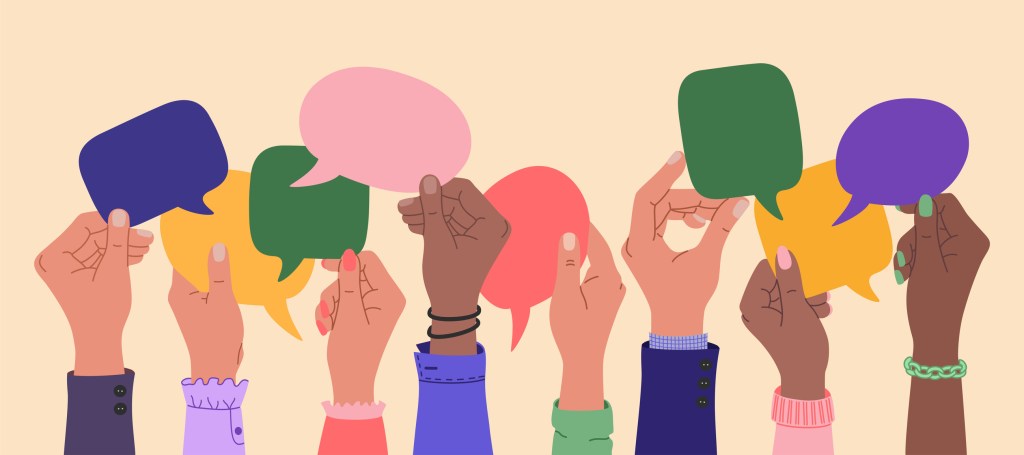As the 2024 presidential election approaches, it may feel like Americans are more divided than ever, despite recent evidence suggesting we’re surprisingly aligned on a vast number of issues. Yet dating as far back as the 1796 face-off between John Adams and Thomas Jefferson, U.S. political campaigns have been hotbeds for quarrels and contempt among constituents.
Differences in opinions are important: They help democracies successful. So too, though, is harmony between citizens. And being kind to those we disagree with during particularly polarizing periods — people who often include our family and friends — is essential to our country’s collective well-being.
It’s easy to let emotions run amok when we feel strongly about high-stakes issues, but it’s far from constructive to sever ties with the people you care about. So Nice News interviewed experts to offer suggestions on how to respect, empathize with, and be kind to individuals with opposing political views.
Practice Humility

Psychology professor and author Daryl R. Van Tongeren is a leading researcher on the science of humility — and when it comes to interacting with people you don’t agree with, being humble is step one.
“When we embrace humility, we accept our own limitations — both the acknowledgement that we humans are limited and can’t know everything and the admission that our own views themselves have limits and are likely flawed,” Van Tongeren said. “Most of us are completely wrong about a few things, and a little bit wrong about almost everything else. None of us knows perfectly.”
That may resonate with you to some degree, but it’s likely you’re currently internally protesting that you absolutely know right from wrong when it comes to certain issues. However, when we put our egos aside and accept that we’re fallible beings, we open ourselves up to learning about and developing empathy for others.
“We should resist the temptation of automatically assuming that we’re ‘less wrong’ than [someone we disagree with it]. That’s just a common way of being biased about our own biases,” said Van Tongeren. “Instead, embrace the idea that, like us, they are trying their best to make sense of this world with their own limitations. And, together, we might be closer to approximating the truth.”
Ask Respectful Questions
It certainly isn’t taboo to talk politics — without healthy discourse, we’d neither educate ourselves nor others. But there’s a difference between talking at someone and talking to someone. Many of our beliefs about “the other side” stem from simply not understanding where that other side is coming from.
Ellen Langer, a Harvard psychology professor who studies mindfulness, explained that “everything looks different from different perspectives.” In other words: You don’t know what you don’t know.
“Two people can be looking at the same aspect from different perspectives. Or they can look at the same aspect from the same perspective, but value it differently,” Langer said. “And all of those will give rise to differences. Once we understand that behavior makes sense from the actor’s perspective, or else he or she wouldn’t do it, there’s no room for judgment.”
She added: “Ask them, ‘Why do you think that?’ If you start off respecting people, then you know that there must be some reason that this makes sense to them.”
Here are 50 questions written by Kenneth Cloke, the director of the Center for Dispute Resolution, that may help facilitate open discussion in political conversations — from “What life experiences have you had that have led you to feel so passionately about this issue?” to “What is one thing I could do that would make this conversation work better for you?”
Get Out of Your Echo Chamber

Being nice to people you agree with can be a piece of cake, but if we’re only spending time around buddies who share our beliefs, we aren’t learning how to extend kindness and understanding to those who we don’t see eye to eye with.
Practicing empathy across divides requires occasionally and willingly crossing those divides. Doing so may also help us develop the aforementioned positive trait of humility.
“While we still need to maintain boundaries and wouldn’t want to engage in behavior that violates our values or sense of integrity, many of us could do a better job widening our social circles to include people with whom we disagree,” Van Tongeren explained. “And when there are hurts, humble people are often able to move toward forgiveness. It can help us repair and sustain relationships because it moves the central focus from ‘me’ to ‘we.’”
RELATED: These Are the 3 Best Phrases to Say When Offering Support, Survey Says
Another tip: Consider reading articles or opinion pieces that fall outside your typical news algorithm — including outlets you might normally be quick to dismiss — so when you’re engaged in discussion with others, you already have some degree of knowledge about their position.
Focus on the Positive
As it happens, family members are often the people we disagree with most around social and political issues, whether due to generational gaps, different life experiences, or incongruent values. Luckily, our relationships with relatives are frequently rich with shared memories, inside jokes, and genuine love — all the more reason they should be cherished and maintained.
So if you find yourself grinding your teeth at dinner as a grandchild or great uncle spouts off on issues you find offensive, rather than engaging in a heated debate at the table, try changing the subject to a fond memory. And if you know in advance these uncomfortable conversations might occur, the American Psychological Association suggests planning fun activities to pick up when things get rocky — like perusing family photo albums together or playing a favorite board game.
Set Boundaries
We’ve all heard the old adage “if you don’t have anything nice to say, don’t say anything at all.” While we’re certainly not discouraging anyone from speaking up about the things they believe in, sometimes the best course of action is to remove yourself from a situation that may result in tense exchanges.
This is particularly applicable to conversations with neighbors, acquaintances, and coworkers. There are times and places to have constructive conversations about politics — around the proverbial water cooler during a break is probably not one of them.
RELATED: What Makes Someone Wise? Global Study Finds Cross-Cultural Agreement on 2 Major Factors
Audra Jenkins, chief diversity and inclusion officer at the HR consulting firm Randstad US, told CNBC there are perfectly polite ways to remove yourself from these conversations.
She suggests saying “I differ in opinion, but that’s an interesting point you make,” perhaps before changing the subject to a work project. Another gracious way to extricate yourself is to say “For my own reasons, I’d rather not discuss this topic. Mind if we ditch it?”
Check out six other suggestions.
In Conclusion
Remember, the only people we can control are ourselves. The next time you find yourself chomping at the bit to chastise or insult someone for their ideas, consider whether your statement will actually add any value or simply cause hurt feelings and anger.
Click here to register to vote if you haven’t already.











